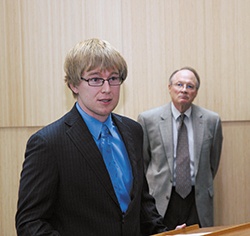Startup Company Picasolar Expands at UA Tech Park
by May 20, 2015 1:28 pm 142 views

Picasolar Inc. has graduated at the University of Arkansas.
The solar startup company affiliated with the UA has relocated its headquarters from the GENESIS Technology Incubator to a space nearly four times as large inside the Enterprise Center. Both facilities are at the Arkansas Research and Technology Park.
Picasolar and its CEO, Douglas Hutchings, held a dedication event Wednesday, hosting several supporters for a reception and tour of the new space.
Picasolar is commercializing a technology developed internally at Silicon Solar Solutions, a UA-affiliated startup founded in 2008 by Shumate, Hutchings and Hafeez Mohammed. Silicon Solar Solutions owns the majority interest in Picasolar.
The technology, a hydrogen selective emitter, could improve the efficiency of solar cells by 15 percent, reducing the manufacturing cost per watt and making the panels more affordable for consumers.
“This space represents a tangible step forward for the company,” Hutchings said. “Most important is the lab space, which houses a lot of the measurement and characterization equipment used to process full-size solar cells. Previously, that was not available in the state of Arkansas. We had to ship our cells more than 4,000 miles away and it would take two weeks to get that done. Now we can do it all in our own lab.”
Hutchings said the company spent approximately $250,000 last year on the external measurements. He said that cost may be cut in half going forward.
“I’d say that is a safe estimate,” he said. “We will still have a small part [of work] that we will send out, but most if it can be done internally by us. Hopefully those savings will allow us to hire additional employees.”
Jamie Fugitt, a lawyer who represents entrepreneurs, emerging companies and technology startups for Little Rock law firm PPGMR Law LLC, attended Wednesday’s event. He has worked closely with Picasolar for several years and said the new headquarters is reflective of a new part of their life cycle.
“They have always been very methodical about their growth, and they have never taken a step that wasn’t justified. This is a big day for them. And for Arkansas, this research park, and [UA] graduates, it’s really incredible. What [Picasolar] is doing right now has the potential to impact a very global industry. This is major league-scale work being done in Fayetteville.”
Hutchings, who earned a doctorate in microelectronics-photonics at the UA in 2010, said the company has eight employees, seven of whom are UA graduates. Those ties notwithstanding, he has a strong belief that the UA research park is the right location to keep the company.
“Anytime we go to raise capital on the east coast or west coast, one of the first questions we are asked is, ‘Are you willing to relocate?’” he said. “Long-term, it makes sense for us to be here. If we’re going to be building and shipping large pieces of capital equipment around the world, Arkansas has a very good logistical structure.”
Picasolar’s business plan was developed in the New Venture Development graduate course in the Sam M. Walton College of Business. Competing as a graduate business plan team, Picasolar won more than $300,000 at graduate business plan competitions in 2013, the same year it began operations at the research park.
Last year, Picasolar raised $1.2 million in equity investments on top of receiving an $800,000 SunShot Initiative award through the U.S. Department of Energy. In April, Picasolar’s super emitter was recognized with a prestigious 2015 Edison Award, recognizing innovation, creativity and ingenuity in the global economy.
